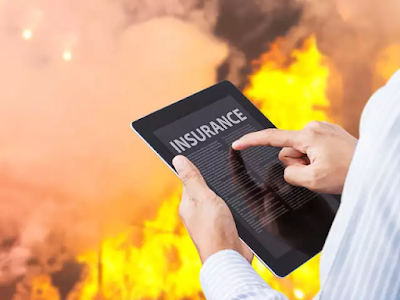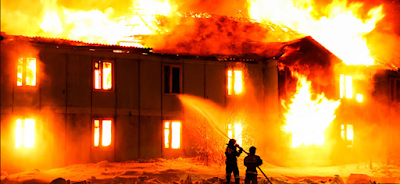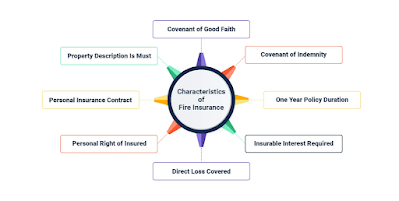What is fire insurance? You may be asking yourself what the heck fire insurance is — aren't we all safe from fire? If so, keep reading! Fire insurance provides financial protection from losses from fires and other hazards. In case you are not aware of it, there are numerous risks associated with owning a home or business because of various incidents that could occur. This includes things such as a fire started accidentally in your kitchen, set by your teenage son who was playing around.
What Is Fire Insurance?
Fire insurance is the financial protection you need in case
of a fire. It's required by law and should be taken out as soon as you buy or
build your home. If you don't have coverage, your home may be completely
destroyed. The term "fire" refers to a variety of events, including:
Combustion. Combustion is the process by which fuel (e.g.,
wood, coal) is burned in a fire; it's also referred to as
"autoignition" or "fire."
Ignition. Ignition is the process by which a spark sets off
an electrical charge that separates and expands into flame; it's also referred
to as "sparking."
Fire damage or loss. Fire damage refers to any physical
damage caused by fire, such as smoke and water damage or structural collapse
due to the heat of the fire; it's also referred to as "loss."
Types Of Fire Insurance
There are two types of fire insurance: primary and
secondary. Primary coverage protects your personal belongings from damage
caused by a fire, while secondary coverage protects the rest of your home from
damage caused by the fire. Secondary coverage usually only pays for the
rebuilding costs, not to repair any damage done by smoke or water.
How Does it Work?
Fire insurance is a type of coverage that protects you
against losses due to fire. It also covers other catastrophic events like
windstorms, earthquakes and explosions. The key to getting the most out of your
policy is knowing how it works.
How It Works
You will have a specified amount of time to file a claim
after experiencing a covered event. The process for filing can vary depending
on the company, but typically involves filling out some paperwork and
submitting it to your agent or insurer. If you need help with the process, you
can contact the provider directly or ask your agent for assistance.
If there is any damage caused by an insured event, your
insurer will pay you directly or reimburse you at their expense after they have
received payment from the loss adjuster hired by the insured party. This
reimbursement may be paid immediately or it may take several months before
final payments are made.
Why do you need it?
Most people think of insurance as something that protects
you from financial loss, but it also protects your property. Your home, car and
other possessions are all covered by insurance in case they're damaged or
stolen.
Fire insurance can help to relieve some of the financial
burden associated with a fire or other disaster. If you rent your home, for
example, fire insurance may cover the cost of rebuilding damages if your home
burns down. If you own an apartment building, it may also provide coverage for
lost income if a tenant's apartment burns down in the event of a fire outbreak.
You need fire insurance to protect the value of your home,
possessions and investments. If your home is destroyed by fire or other
disaster, your insurance company will help replace it with a similar house or
pay for damages to the building and contents.
The same goes for vehicles, tools and other valuable items.
If you have a car worth thousands of dollars and a thief steals it from you,
the insurance company will help replace it with another vehicle or pay for
damages to the car itself.
If you own an investment property — such as commercial real
estate — then you'll want to get coverage at least as high as your mortgage
amount. A lot of small-business owners also buy additional commercial property
insurance because they want coverage beyond their primary business location.
And even if you don't own any property or investments,
getting homeowners' or renters' policies can be helpful in case there's an
emergency situation that affects your family members (like a fire) or damage
occurs to something outside.
Why You Should Have It?
Your home is your most valuable asset. It’s where you live,
sleep and relax with your family. And it’s a major investment that you want to
protect as much as possible.
So why do you need fire insurance? Here are some reasons:
If your house is damaged by fire or smoke, you may have to
pay for the repairs. This could be expensive, especially if your house was not
properly insured in the first place.
You can also face property damage from a fire caused by
faulty wiring or appliances. If you don’t have adequate fire coverage, this can
leave you financially vulnerable and unable to rebuild or repair your property
completely.
The best way to protect yourself against loss due to fire is
through homeowners insurance coverage.
Conclusion
As you can see, there are many good reasons to purchase fire
insurance. If you own a home with anything of value in it, then it is time to
invest in a fire insurance policy. It won't always prevent the damage or loss,
but it will definitely help you when a fire that happens. And if you never have
a fire, the policy will never cost you anything until your time to use it
arrives. That's why it is smart to invest money in this type of insurance. Renters
need fire insurance. Period. Yes, it's not exactly glamorous, and it can be
difficult to fit into a budget that's already stretched pretty thin. But the
peace of mind you'll get from knowing that you're covered if disaster strikes
is more than worth the monthly fee. If you're lucky enough to be in a situation
where you own your house outright, it still pays to buy insurance for
catastrophic events like floods and earthquakes—and knowing what to look for
can help you find the right policy at a good price.
You may like to read: Marine Insurance- Meaning, Types, Features and Coverage









0 Comments